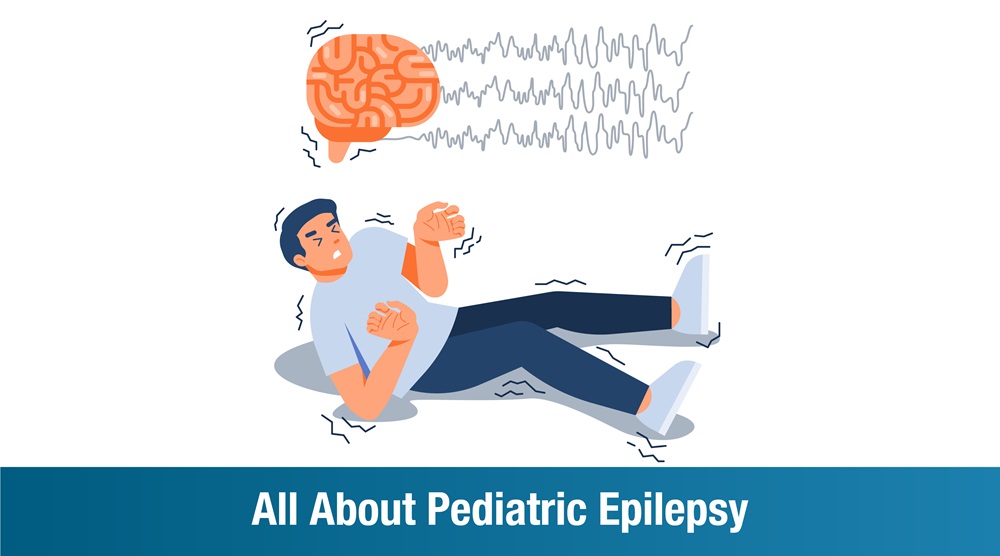
Epilepsy is a neurological condition that affects people of all ages, but its impact on children can be particularly challenging. In this comprehensive blog, we’ll delve into the world of pediatric epilepsy, exploring its causes, symptoms, diagnosis, treatment options, and management strategies.
Understanding Pediatric Epilepsy
Pediatric epilepsy refers to a spectrum of neurological disorders characterized by recurrent seizures. Seizures occur due to abnormal electrical activity in the brain, leading to various symptoms depending on the type and severity of the seizure. These episodes can range from mild staring spells to convulsions involving loss of consciousness and muscle spasms.
Causes of Pediatric Epilepsy
The causes of pediatric epilepsy can be diverse and multifactorial:
- Genetic factors: Inherited genetic mutations or family history of epilepsy can predispose children to the condition.
- Brain abnormalities: Structural abnormalities in the brain, such as tumors, cortical dysplasia, or brain malformations, may contribute to epilepsy.
- Perinatal injury: Birth injuries, including hypoxic-ischemic encephalopathy (lack of oxygen to the brain during birth), can lead to epilepsy later in childhood.
- Infections: Certain infections, such as meningitis or encephalitis, can trigger inflammation and subsequent seizures.
- Metabolic disorders: Disorders affecting metabolism, such as mitochondrial diseases or inborn errors of metabolism, may manifest with epilepsy.
Types of Epilepsy
There are various types of pediatric epilepsy, each characterised by distinct seizure patterns, age of onset, and associated symptoms. Here are some common types:
Benign Rolandic Epilepsy: Typically occurs between ages 3-13, involving seizures affecting the face and tongue during sleep.
Childhood Absence Epilepsy: Characterised by brief staring spells or loss of awareness, often mistaken for daydreaming.
Dravet Syndrome: Rare and severe epilepsy syndrome beginning in the first year of life, often involving prolonged seizures and developmental delays.
Lennox-Gastaut Syndrome: Begins in early childhood with multiple seizure types, intellectual disability, and abnormal EEG patterns.
West Syndrome: Starts in infancy with infantile spasms, characterized by brief, repetitive muscle contractions.
Juvenile Myoclonic Epilepsy: Typically begins in adolescence with myoclonic jerks, generalized tonic-clonic seizures, and occasionally absence seizures.
Temporal Lobe Epilepsy: Involves seizures originating in the temporal lobes of the brain, often with complex partial seizures and alterations in consciousness. Read about temporal lobe epilepsy here.
If you wish to know more about the Types of Epileptic Seizures click here.
Symptoms of Pediatric Epilepsy
The symptoms of pediatric epilepsy can vary widely among children depending on the type of epilepsy, seizure frequency, and individual characteristics.
Let’s take a closer look at the symptoms:
Seizures
- Generalized Seizures: Involving both sides of the brain:
- Tonic-clonic seizures (formerly known as grand mal seizures) with convulsions, loss of consciousness, and muscle rigidity.
- Absence seizures (formerly known as petit mal seizures) characterized by brief staring spells or loss of awareness.
- Myoclonic seizures involving sudden, brief muscle jerks.
- Focal (Partial) Seizures: Beginning in specific areas of the brain:
- Simple partial seizures causing localized symptoms like twitching, sensory changes, or unusual sensations.
- Complex partial seizures with altered consciousness, repetitive movements, or automatisms (automatic behaviors).
Aura
Sensory or perceptual experiences preceding a seizure, such as visual disturbances, smells, or emotional changes.
Behavioral Changes
Sudden emotional outbursts, confusion, or memory lapses before or after seizures.
Developmental Delays
Delayed achievement of developmental milestones, affecting motor skills, speech, or cognitive abilities.
Treating Pediatric Epilepsy at Plexus
Plexus offers custom treatment plans based on child’s unique condition, age, frequency of seizures, as well as other health factors and comorbidities. Our Epilepsy Clinic facilitates overall improvement by making structured routines a part of your little one’s daily life. This is done in order to:
- Minimise your need for anti-seizure medications
- Significantly improve your quality of life
- Reduce associated costs of living with epilepsy
- Lower risk of complications and emergencies associated with seizures
- Increase your chances of returning to work
Our multidisciplinary approach addresses both medical and psychosocial aspects of care, and can greatly help achieve better seizure control.
Pediatric epilepsy presents unique challenges and complexities, but advancements in diagnosis, treatment options, and supportive care are improving outcomes for children affected by this condition. By understanding the causes, recognizing symptoms, and implementing personalized treatment plans, we can empower our little ones to thrive and achieve their full potential.
To know more about epilepsy and the available treatment options at our Epilepsy Clinic, reach out to us today.
WhatsApp +91 89048 42087
Call +91 78159 64668 (Hyderabad) | +91 82299 99888 (Bangalore)
FAQs
Can a child live a normal life with epilepsy?
Yes, with proper treatment and management, many children with epilepsy can lead normal lives.
What are the first signs of epilepsy in a child?
Early signs may include staring spells, sudden jerking movements, temporary confusion, or loss of awareness. These symptoms can vary in duration and intensity.
How to treat epilepsy in children?
At Plexus, we offer individualised treatment plans based on seizure type, frequency, and underlying cause. Our programs include a combination of Cell therapy, physical therapy, occupational therapy, speech and language therapy, and more.
Is childhood epilepsy curable?
Epilepsy in children is generally managed rather than cured. Having said that, some children with benign childhood epilepsy syndromes have also outgrown seizures as they matured. At Plexus, our treatment for epilepsy aims to control seizures effectively and improve quality of life.
Is epilepsy serious in children?
Epilepsy can be serious depending on the type and frequency of seizures. It may affect cognitive development, school performance, and even everyday activities. However, with timely intervention and treatment, many children with epilepsy have gone to achieve good seizure control and lead fulfilling lives.










